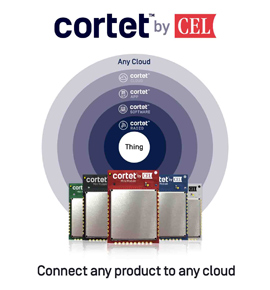CEL Adds Voice Control and Solves the Network Latency Problem for Large Scale Lighting and Industrial Applications
October 4, Santa Clara, CA
CEL today announced that it has added new features for its Cortet Connectivity Suite – a turnkey wireless solution that bridges the gap between ‘things’ and the cloud. Cortet enables building automation, lighting control, smart home, industrial and machine to machine (M2M) product manufacturers to confidently link their physical ‘things’ to the digital world.
CEL’s new Cortet Voice Control makes it easy for integrators and manufacturers to add natural voice control capabilities for a wide range of “smart” applications, including lighting, climate control and building automation.
 The new Cortet Instant Broadcast architecture solves the problem of “popcorning” or latency from network delays that can occur when a single command is used to control a wide range of networked lights, appliances and devices. By using Cortet Instant Broadcast, instead of coming on at various times, all the devices actuate simultaneously and without delay. CEL has developed a scalable technology that greatly reduces latency and enables almost instant control of very large industrial networks.
The new Cortet Instant Broadcast architecture solves the problem of “popcorning” or latency from network delays that can occur when a single command is used to control a wide range of networked lights, appliances and devices. By using Cortet Instant Broadcast, instead of coming on at various times, all the devices actuate simultaneously and without delay. CEL has developed a scalable technology that greatly reduces latency and enables almost instant control of very large industrial networks.
At Sensors Midwest, CEL demonstrated a lighting-specific implementation of Cortet that enables smart lights to be easily controllable by a mobile app and by cloud platforms including voice control with Amazon’s Echo. This solution includes RF hardware, firmware, application software, and remote cloud software. Cortet enables OEMs and developers to quickly and easily radio enable their appliances, devices and sensors, and also integrate them into an intelligent solution complete with local and IoT based controls, analytics and application software.
“Unlike other IoT connectivity systems and platforms, Cortet provides scalable and truly latency-free local control and monitoring,” says Paul Minton, CEO of CEL. “Competing cloud-based IoT systems that rely on cloud decision making and control suffer from two major compromises. The first is slow response times and the second is a dependency on an often precarious, ‘always-on’ Internet connection.”






